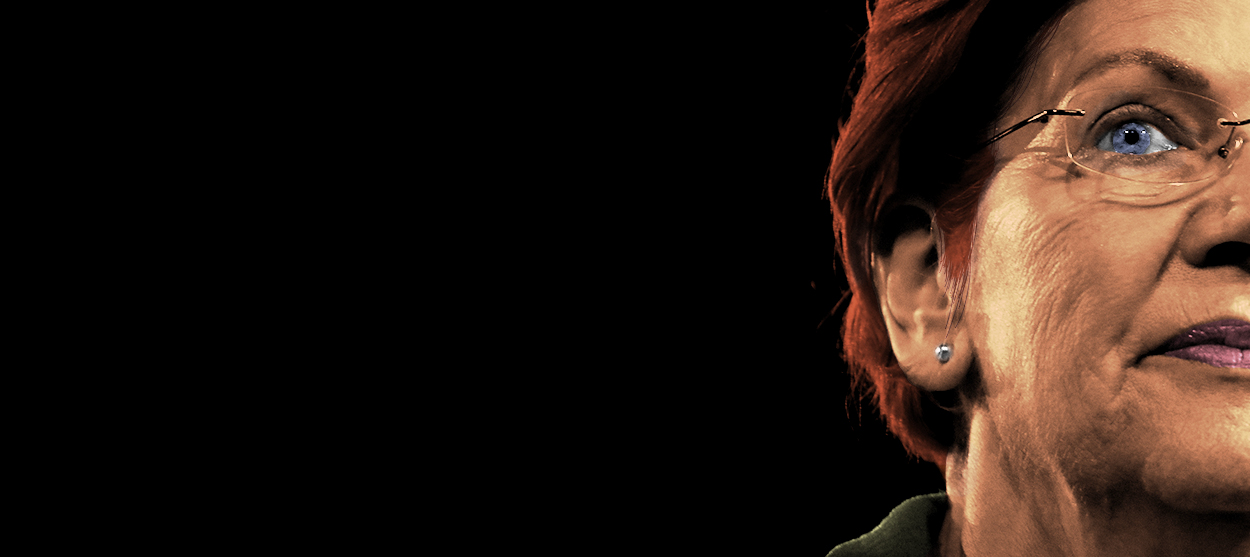The sidelining of Elizabeth Warren
The media is pushing out the Democrats' best chance at unity


A free daily email with the biggest news stories of the day – and the best features from TheWeek.com
You are now subscribed
Your newsletter sign-up was successful
The 2020 presidential race was always going to be an uphill battle for Elizabeth Warren.
Almost from the get-go, political pundits fretted about Warren's electability, setting in motion a self-fulfilling prophecy now reflected in the New Hampshire primary results. Warren's disappointing showing on Tuesday comes on the heels of a stirring debate performance and a strong third place finish in the Iowa caucuses — two wins largely ignored by mainstream media commentators, who focused almost entirely on Bernie Sanders and Pete Buttigieg, with a spare thought for Amy Klobuchar's rise and Joe Biden's descent.
Defeating Donald Trump in the 2020 presidential election is priority number one for the Democratic establishment, and a moderate candidate with the potential to sway swing voters and Republican defectors has long been billed as the wisest course. But by constructing a dichotomy between the self-described revolutionary leader Sanders and the aggressively non-threatening trifecta of moderate candidates (not to mention Bloomberg, who is suddenly the darling of cable news), the networks and pundits with the greatest persuasive power have ignored and undercut Warren's unique potential to unite the progressive left and hesitant center.
The Week
Escape your echo chamber. Get the facts behind the news, plus analysis from multiple perspectives.

Sign up for The Week's Free Newsletters
From our morning news briefing to a weekly Good News Newsletter, get the best of The Week delivered directly to your inbox.
From our morning news briefing to a weekly Good News Newsletter, get the best of The Week delivered directly to your inbox.
Warren seems to have unfairly inherited some of the hallmarks of Hillary Clinton's reputation. Clinton's devastating 2016 upset sparked practical questions as to whether a woman could win the presidency at all. And Warren's false claim to Native American heritage sealed a reputation for untrustworthiness that has stuck long after that conversation faded away. If Clinton, with all of her name recognition and experience, couldn't win against Trump, what hope could there be for the woman widely considered her successor?
Warren's progressive policies and folksy demeanor also framed her for many as a sort of second-tier Sanders, not far enough left for the progressives and too far left for gun-shy moderates. But it is precisely this position that makes her the most electable candidate.
Warren and Sanders are mostly aligned on their signature issues, but how they present these issues is entirely different, as are their proposed paths to achieve them. Sanders does not shy away from the word "socialist." He declares outright that his Medicare-for-All plan will raise taxes. He says billionaires should not exist. These declarations and convictions are brave and they are admirable. But they also inspire commentators like Chris Matthews to worry on-air that a Sanders administration will begin executing the wealthy in Central Park, French revolution style.
Warren takes a more measured approach in selling her policies, focusing on how she'll achieve them rather than the eventual outcome. She doesn't say billionaires should not exist, she proposes a wealth tax. Warren doesn't say "socialist," choosing instead to present the economic and social advantages to her plans without the label. The other key difference between Sanders and Warren is that, while Sanders has identified as far left for his entire political career, Warren was a committed Republican long before she became a progressive Democrat. As other commentators have noted, this history might not earn her many points with committed leftists, but it does put her in a unique position to appeal to the moderates and Republicans that candidates like Buttigieg and Klobuchar are trying to court. After all, she used to be one of them. And perhaps most importantly, polls continue to show Warren performing just as well as those candidates, if not better, in hypothetical general election matchups against Trump.
A free daily email with the biggest news stories of the day – and the best features from TheWeek.com
Yet the mainstream media seems determined to undermine her viability.
Sanders and Buttigieg finished neck and neck in the Iowa Caucuses (whose dubious import is a conversation for another day), with Warren close behind in third. As the dust around the disastrous vote-counting began to settle, the media centered the conversation on Sanders, Buttigieg, and Biden. For example, this headline from The Washington Post reads: "Buttigieg and Sanders take lead, Biden fades in partial results from marred Iowa caucuses," ignoring Warren's close third place finish entirely in favor of Biden's fourth.
During Friday's Democratic debate, many critics noted the relatively short speaking time given to Warren in comparison with her white male competitors. Afterwards, coverage again focused on Buttigieg, Klobuchar, Biden, and Sanders, despite Warren having the highlight of the night, when she responded to Buttigieg's embarrassing stumble on a question about race.
For what it's worth, Sanders followers have also complained of a media bias against their candidate, and indeed, on-air pundits seem unwilling to concede to the electibility of Sanders either, but they do not ignore him. Eagerness for a moderate candidate may also explain their embrace of Klobuchar following the debate, who was stronger than usual but far from a dominant presence.
Even the most politically engaged voter relies at least in part on media analysis and commentary when forming their opinions. Watching Klobuchar's rise from poor showing in Iowa to close third-place in New Hampshire, a distinction separated only by powerful media outlets who declared her debate winner, it's probable her improved standing is attributable at least in part to these assessments.
Meanwhile Warren, relegated to a footnote, has lost momentum with voters who cease to believe in her electability — a narrative prescribed by the media, not assessed.
Want more essential commentary and analysis like this delivered straight to your inbox? Sign up for The Week's "Today's best articles" newsletter here.
Kathleen Walsh is a freelance writer and editor in New York City focused on the intersection of feminism, culture, and politics. Her work can be found in Cosmopolitan, Romper, and elsewhere.
